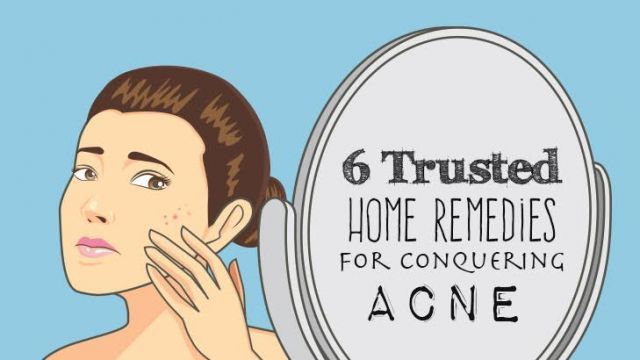
Acne may be the bane of your existence. In the summer, sweat and grime makes the situation even worse. You may have tried lots of over-the-counter products with little or no success. If you’re fighting a war against acne and the zits are winning, try a new tack. Certain home remedies may help turn the tide in your favor if you suffer from moderate acne.
Anyone plagued by severe, potentially disfiguring acne should consult a dermatologist, although home remedies are worth a try.
Milk of magnesia
Your grandmother might keep a bottle of milk of magnesia in her medicine cabinet to keep her “regular.” If you have oily skin, milk of magnesia — formally known as magnesium hydroxide — soaks up excess oil and leaves skin smooth. Use it either as a daily toner after washing your face, or place it on emerging zits before going to bed. Odds are the pimple won’t be there in the morning.
Aspirin mask
Plain aspirin consists primarily of salicylic acid, the main ingredient in many over-the-counter acne products. Save money by making a simple aspirin mask, consisting of five to seven crushed, uncoated aspirin and water. Mix the aspirin and water until it forms a paste. If your skin is especially sensitive, add a drop of honey to the paste. Apply the mask to your clean face and leave it on for about 15 minutes before washing it off with warm water. Use the mask two to three times a week. If you’re aiming to destroy one or more specific zits, leave the paste on them overnight.
Baking soda mask
Another common, cheap household product that gets rid of acne is baking soda, or sodium bicarbonate. It helps destroy bacteria on the skin that causes acne, exfoliates and unclogs pores. Combine eight teaspoons of baking soda and approximately four teaspoons of water to make the paste. Slather it on your clean face, and leave it on for 15 minutes before washing it off with warm water. Use the mask twice a week. As with the aspirin mask, you can put the paste on pimples overnight for happy results in the morning. Regular use of the baking soda mask can also eliminate acne scars.
Emerging pimples — ice to the rescue
If you feel a pimple forming, head to the freezer. Take an ice cube out of the tray and wrap it in a clean washcloth or similar thin cloth. Hold to the red area. The ice reduces the inflammation, and it’s possible the zit will disappear or remain relatively small.
Minerals for acne
Certain minerals help reduce inflammation, among other benefits, and should be part of your supplement arsenal.
- Magnesium — this mineral helps regulate hormones. Fluctuating hormones may trigger acne flare-ups. Magnesium has anti-inflammatory properties, so pimples are less noticeable.
- Zinc — acne sufferers often have low zinc levels. Zinc helps combat bacteria-causing acne, and lessens the swelling and redness — the inflammation — when pimples form.
- Methyl sulfonyl methane — MSM contains sulfur, found in minute quantities in your body. MSM is usually geared toward arthritis sufferers, but it also helps your skin. The properties that combat arthritis also reduce acne inflammation. MSM can eradicate the gram-positive bacteria causing acne.
Vitamins for acne
Several vitamins reduce outbreaks and keep your skin — and body — healthy. For fighting acne, the most important vitamin supplements include the following:
- Vitamin A — people with acne often have low levels of this antioxidant. Because high levels of vitamin A can lead to toxicity, play it safe and use it in the beta-carotene form.
- Vitamin C — this vitamin boosts the immune system and aids in healing blemishes.
- Vitamin E — this is another vitamin generally insufficient in those prone to acne. Make sure to take natural rather than synthetic vitamin E supplements.
The acne battle isn’t fought in a vacuum. Along with home remedies and supplements, it’s crucial to consume a healthy diet, get plenty of rest and avoid touching your face. The latter is important because your hands and fingers can transfer or spread bacteria onto your face, triggering an outbreak.
—Jane Meggitt

